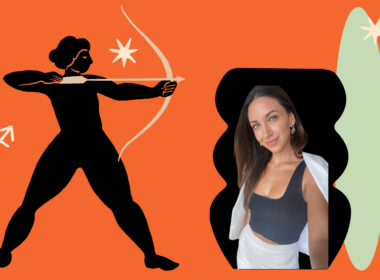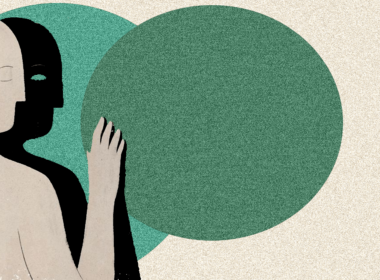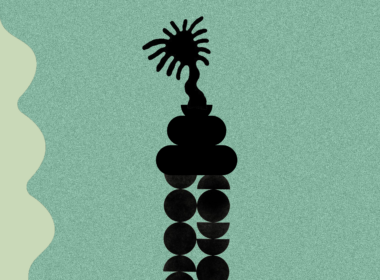Rythm is the trusted destination for nontoxic intimacy essentials that enhance your sexual well-being. We are on a mission to strengthen your vagina-mind-spirit connection. For our blog series “Humans of Rythm”, we interview founders, thought leaders, and experts in the sexual wellness space and share their responses with you.
Dr. Candice Nicole is an award-winning psychologist, sexologist, and professor with a mission to remind people of their inherent worthiness of pleasure. As an associate professor of counseling psychology at the University of Kentucky, she studies sexual wellness and liberation.
She is also the host of F*ck the System: A Sexual Liberation Podcast and How to Love a Human, a liberation podcast that asks people with multiple marginalized identities what the world would be like if it loved them.
As a leading expert in sex research, she has published over 50 research articles and has been featured in the Huffington Post, the APA Monitor, Well+Good, Women’s Health, Blavity, Cosmopolitan, and the New York Times.
Read below to learn more about Dr. Candice Nicole, a caring Capricorn, and role model for black women in sex research and sex therapy.
Where were you born, where did you grow up, and how was sex perceived in your culture/household?
I’m originally from a town called Lockport, New York, which is outside of Niagara Falls but then I moved quite a bit and ended up in Virginia, when I was in my early teens, then in Georgia, the suburbs of Atlanta, when I was in my late teens at age 16. So I’ve lived in 3 different places throughout that arc of my early sexual development.
I would say culturally the messages were different in each place. So when I left Western New York when I was about 12, based on age and the climate, living predominantly with grandparents at the time, there was this idea that you should wait until marriage and that sex was something I shouldn’t be thinking about because I needed to be focused on academics. I’d be told: “You’re going to college and you are going to be one of the first ones to go to college, that’s important.”
On the other hand, it was the era of hip hop, so hip hop artists like Lil Kim and Foxy Brown were talking about sex through a positive and more expressive lens, so I was growing up with that and understanding myself as a sexual being.
I was also curious and precocious very early on, making my masturbation debut between age 8 and 9. I was reading books about how my body was going to develop during puberty and things like that, so I’ve always been interested in those topics.
And then when I moved to Virginia, I made my sexual debut at age 14 with a partner, which is relatively early among girls. But it felt like a good experience for me. And so the messaging was not necessarily affirming of my sexuality, but it also wasn’t prevalent or strong enough to stop me from being sexually explorative.
What’s a funny or embarrassing memory you have from when learning about or experiencing sex?
I always like to tell the story of me and my first, who was this white drummer boy with long greasy hair and JNCO jeans. We were transgressing norms in the south because he was a white guy who lived on one side of the tracks and I was a black girl who lived on another side of the tracks, and we were in a racially separated small town in Virginia. So everybody was like ‘what is going on with those two’, but it really was still a nice, beautiful, sexual debut experience.
It was always an interesting story to tell because I felt knowledgeable enough about sex, even though we didn’t have good sex ed, to know that I wanted to advocate for condom use and that certain types of condoms did certain types of things.
However, I wasn’t yet at the place where I could advocate for my own pleasure and orgasm, even though I knew how to bring myself to orgasm. So, like most girls my age, I faked it!
What is your profession and why did you choose to pursue it?
I am an associate professor in counseling psychology, and my primary focus is on sexual wellness and liberation. My research examines what good sex is, how people get it, how people understand it, and how it relates to sexual health overall. I’m also a licensed psychologist and I practice that on the side.
Similar to the stories that I told about early childhood, there just wasn’t good sex education, so when I found out sex research and sex therapy was a career path, I was like “Oh my goodness, I get to be the person that helps people better educate themselves and have better sex lives”. That was always exciting.
What about your industry surprised you when you were first getting started? What is something about your industry that might surprise those who are not in your line of work?
The underrepresentation of black women in sex research and in sex therapy. I know a community of black women, but it’s a disproportionate number of us in this field. Given the experiences that black women have as it relates to sexual health and STI’s, and all of the stereotypes that get levied upon black women based on anti-blackness and racism, we need more representation in the field.
So I love being able to be a professor because that means I get to recruit and retain other black women into the field who want to be researchers and sex therapists. I’m filling in that ladder of leadership.
Was there anything you were surprised to learn about your body or your relationship with your body, yourself, your vulva, that has changed in the past decade?
Oh absolutely, I just turned forty, and so much has changed in the past decade. I had a child in the past decade. My body has experienced quite a bit of reproductive health issues, and so the way I experience what is pleasurable sexually has definitely had to change, and I’ve had to be more mindful of that.
What it has allowed me to do is better communicate my sexual needs. I understood that from a research lens but then I got the practical, lived experience of it because of childbirth and reproductive concerns. Certain positions that used to work really well don’t work really well for me anymore, or there’s numbness in certain areas because of my cesarean section or other surgeries, that led me to ask “what do I do about this?”.
I’ve had an ectopic pregnancy which was near fatal, so after that, I had trauma around sex and really had to grieve and process it with my therapist. Even though I know the science and do the practice, I’m a full human being, and that evolution has been a part of my journey.
I love to be able to share that with women because so many people miscarry, or have reproductive health concerns. Many people have children and then don’t get the information about what could possibly change, but it doesn’t have to be the end of your sexual self as you know it.
Are you able to share what does end up changing after you have a child and you want to reactivate your sex life?
Some of the things that I named were that I had a Cesarean section, so I had numbness around my pubic mound. Then I had a surgery in the same place as the incisions from the Cesarean, which left me with two incisions in the same area. That changes the nerve endings! Depending on the type of positions you are choosing sexually, the pressure on your body may not feel good in the way that it used to, so you have to adjust positions.
Is is almost like you have to relearn sex all over again, because your body is this foreign object now and you don’t know what works and doesn’t work?
I think you have to expand. I’m not relearning as much as I’m expanding my definition of what sex can be and expanding how pleasure can be available to me.
Some changes can be recognizing that I liked to be touched a certain way before I was a mom, but that I like to be touched in a different way now. Or it may take longer to warm up and to feel aroused because I’m exhausted. Those are just expanding, like it doesn’t have to be a quick or fast thing, sometimes it needs to be slow, sometimes it doesn’t even have to include penetration.
These were things that I knew but that I didn’t have to deal with based on certain types of privileges, that now I have more information about because I’ve lived it.
Is there anything interesting that has come up in your research, out of all the various research papers you’ve conducted, that could be a fun tidbit to share with our audience of moms and menopausal women?
We did a big sex study where we surveyed around 500 black people with different diverse identities outside of their blackness, like their sexual identity, age, and more. We did interviews and focus groups, so we had a lot of data. The finding that stuck with me and felt good to me is that we find ourselves pleasure worthy despite the stereotypes, the stressors, the ups and downs of life especially at the intersection of race and gender. Over 90% of the people in our sample said “ I find myself extremely worthy of pleasure” and I thought that was a beautiful thing.
How do you find your rythm in connecting with your body, yourself, your mind, spirit, and pleasure system?
I had to have a lot of self compassion around my pace changing and that being okay. So my rythm in my twenties was “I got to get there first and fast”, and my rythm in my thirties was like “Okay I could, but at what cost?, and now my rythm in my forties is like “I’m enough, I’ve done most of the things that I’ve wanted to do in life, I get to pace myself at the speed of my capacity as opposed to where I think I should be by now or how fast I used to be able to go.”
So my rythm is shifting and I’m building in a lot more grace, compassion, stillness and rest into my rythm.
What can a partner do to increase intimacy for you both inside and outside the bedroom?
Taking things off my plate is always nice. Me and my husband talk about that all the time. There are some things I feel compelled to do, but if they’re already done, that frees up my cognitive energy and my embodied and erotic energy. So that helps a lot, for both of us. It goes both ways.
It can be things like household chores, choreplay is a thing, and childcare stuff, like who’s gonna spend the love energy that it takes to do a bedtime story tonight? That’s not a chore but it’s something that is going to take some good energy. So if my partner can do that, great, that means I get to take a longer bath and my body can feel reset. And we swap those out to have a nice balance around gender.
Another thing I do to take care of myself, because I’m a big introvert, every quarter I like to take a weekend alone to be by myself. I’d get a hotel room, eat the food I like, be in silence, watch netflix and do whatever I want to do by myself. So one time my husband planned one for me and even invited a massage therapist to come to the hotel room. So it was something my partner did that was just for me alone and that was really nice.
What is your favorite quote for finding your rythm or living in your rythm?
It’s from a CeeLo Green song in the early 2000s, “Until you are truly ready to say fuck your fears, you are not alive.”
For me this past year and a half, because I had my ectopic pregnancy in 2021, it has really been about surviving that and thinking about what my rythm is, what my pace is, and how fear gets in the way of that. It got me asking myself “What have I been afraid to do for a long time, that now that I have a second chance at life I get to do?”
I also learned how to swim last summer. And I learned to float. Which I had not known how to do for 39 years at that point. I decided to not be afraid of water anymore. Water teaches me lessons about rythm. The ebb and flow of water, like floating, as a practice grounds me. And it came from that quote around fear.
What’s your go-to song to get in the mood? Or, what song helps you find your ‘sensual rythm’?
Float by Janelle Monae, gets me in my rythm to dance.
For getting in the mood with my partner, I have a whole playlist! But anything by Floetry. The song called ‘Getting Late’ by Floetry is a beautiful one.
What is your favorite sexual wellness product that you can’t live without?
I just recently discovered suction toys from all the hype they were getting on social media. I found one last year, and it totally lives up to the hype! I typically like vibrators, but I found that I like the suction and vibration a lot.
You can find Dr. Candice Nicole on the following platforms:
Company Name: Center for Healing Racial Trauma
Personal Instagram handle for promotion: @dr.candicenicole
Website: https://www.drcandicenicole.com/
Podcast 1: F*ck the System: A Sexual Liberation Podcast
Podcast 2: How to Love a Human, a liberation podcast
Edited by:
Rythm







